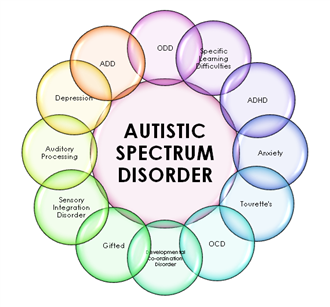
World Autism Week
27 March 2018
World Autism Week is a time to help us be more mindful and understanding of what we can do to help people who have Autism (sometimes referred to as ASD). Autism is often known as a ‘hidden condition’ as there is no real way of identifying someone with Autism just by looking at them. Whilst people with the condition can sometimes have similar, identifiable traits like struggling to interact socially, preferring routine and structure, and being sensitive to their sensory surroundings, this can vary depending on their age and where they are in respect to the autism spectrum. Because the spectrum is so wide-ranging you should never make assumptions about an individual’s condition based on what you know or identify to be connected to Autism as everyone is different and no two people with the condition are exactly the same.
First and foremost, those with Autism are more than just ‘Autistic’ they want to be seen for more than their diagnosis. Their condition is a very small part of who they are, and they always appreciate people just accepting that and treating them like everyone else (but with mindfulness for what they are and are not comfortable with). Many people with ASD struggle with physical contact and being touched, even just someone brushing past them can be considerably distressing. This is something to bear in mind if you would normally touch someone’s arm to ask them a question or touch someone’s back if you’re squeezing past them in a small space.
A sensory overload can be a result of a person with ASD being touched, an overload of noises going on around them that they can’t process, or their routine being changed. All of this can cause someone with Autism to get very anxious, angry, and distressed. In many children, this can lead to them having an episode that most would just label as a tantrum when in fact they’re releasing their feelings through an outburst of emotion. In situations like this staring and making a judgment is the worst way you can react, not only can it escalate and worsen the situation as the individual having an outburst notices people staring at them, but it makes those with the person become distressed and judged for what neither of them can control.
There is a large assumption that those with autism cannot read emotion, and whilst sometimes they can struggle to read social cues or body language, those with ASD pick up on negative or judgemental attitudes. They often react to this the same way anyone who doesn’t have ASD would, by shutting down and feeling negative about themselves. Having patience and understanding can go a long way when communicating or helping with someone who has ASD.
If you find yourself in the same space as someone with ASD who appears to be distressed and upset and they don’t have anyone with them, asking if they’re ok and if they would like to get to a quiet space can be incredibly helpful. Some may want to deal with their emotions in their own way and on their own and this is fine but offering your help and understanding could be the escape and calm that they need. Alternatively, if you are in the same space as someone distressed and upset and they do have someone with them helping them, not staring and being understanding is the first way to react. If you feel that they need help and you’re in a position to do so, asking the person they’re with if you can help is something parents and friends of those with ASD are always appreciative of, they may not accept but offering your support is very welcome.
Learning to understand the behaviours and challenges people with ASD experience helps us to overcome the stigma and lack of understanding about the condition and allows those with Autism to feel more accepted and understood in their day to day life.
For individuals’ personal experiences of living with Autism: http://www.autism.org.uk/toomuchinformation
For more information on the behaviours, characteristics of someone with Autism: http://www.autism.org.uk/about/behaviour.aspx
The above information has been gathered from the personal experiences and advice of those who have been diagnosed with some level of ASD, sources listed below.
https://autismum.com/2012/05/07/10-tips-on-how-to-communicate-with-autistic-people
https://www.psychologytoday.com/us/blog/autism-in-real-life/201101/10-things-you-can-do-help-autism-family
http://www.autism.org.uk/get-involved/tmi/stories/
Comments